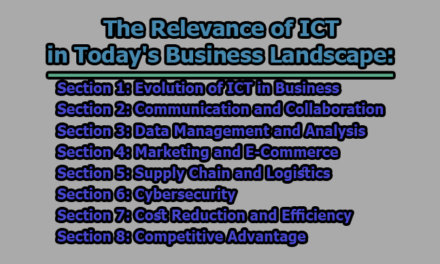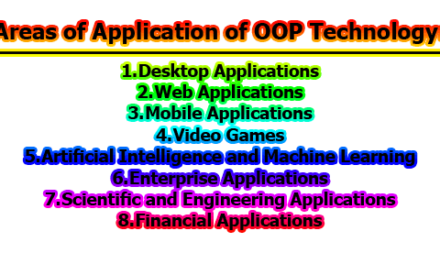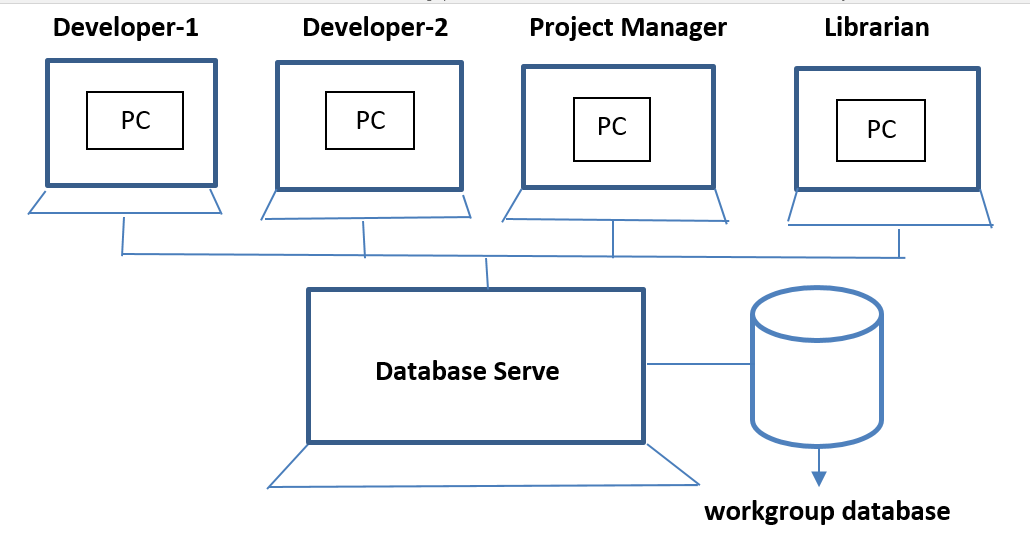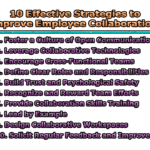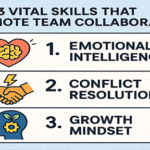The Importance of Networking:
Networking is a fundamental aspect of human interaction that has been around for centuries. In today’s fast-paced and interconnected world, the significance of networking has only grown, extending its reach to various aspects of personal and professional life. Whether you’re a student, a professional, an entrepreneur, or even a retiree, networking plays a vital role in shaping your opportunities, career, knowledge, and overall growth. This article delves into the importance of networking.
1. Opportunities for Collaboration: Networking provides an avenue for individuals and organizations to collaborate effectively. Collaboration, in a professional context, refers to the joint efforts of different parties to achieve a common goal. Networking opens doors to potential collaborators who share similar interests or objectives. These collaborations can take various forms, including partnerships, joint ventures, research initiatives, and co-creation of content. Through collaboration, businesses can leverage each other’s strengths and resources to create innovative solutions or products. Furthermore, individuals can pool their expertise and knowledge to accomplish projects or tasks that might be beyond their individual capabilities. Collaboration fosters creativity and synergy, ultimately leading to more substantial achievements than those that can be attained in isolation.
2. Career Advancement: Networking is essential for career advancement. The saying “It’s not what you know, but who you know” holds true in many professional fields. Building a strong professional network can significantly impact your career progression. Networking provides opportunities to meet influential individuals who can become mentors, sponsors, or advocates for your career. These connections can offer insights, advice, and guidance that can be instrumental in making informed career decisions. Additionally, networking events, such as industry conferences and seminars, can help you stay updated on industry trends and gain a competitive edge. Networking is often the key to unlocking job opportunities and promotions, as many job openings are not publicly advertised but are filled through referrals and recommendations.
3. Knowledge and Information Sharing: Networking is a powerful platform for the exchange of knowledge and information. In an information-driven age, staying up-to-date with the latest developments and insights in your field is crucial. Networking events, online communities, and professional associations offer valuable opportunities to share and acquire knowledge. You can engage in discussions, attend workshops, and learn from experts and peers. This continuous learning process enhances your skills and expertise, keeping you at the forefront of your industry. Sharing knowledge not only benefits you but also contributes to the collective growth of your field, fostering innovation and progress.
4. Access to Resources: Networking expands your access to resources. Resources may include funding, technical support, market research, or specialized equipment. In a business context, entrepreneurs often require financial backing and expertise to turn their ideas into reality. Networking allows them to connect with potential investors, mentors, and partners who can provide the necessary resources. For professionals, networking can open doors to job opportunities, training programs, and access to valuable industry databases or tools. Whether you need funding for a startup, access to specialized software, or support for personal development, your network can be a valuable source of resources.
5. Personal Growth: Networking is not limited to professional development; it also promotes personal growth. Meeting and interacting with individuals from diverse backgrounds and experiences can broaden your horizons. It can lead to personal enrichment by exposing you to different perspectives, cultures, and ideas. Networking can improve your communication and interpersonal skills, making you more effective in various aspects of life. Additionally, it can boost your self-confidence and self-esteem, as you gain recognition and validation from your network. Through personal growth, you become a more well-rounded and adaptable individual, capable of thriving in a rapidly changing world.
6. Building Trust and Credibility: Trust and credibility are invaluable in both personal and professional relationships. Networking allows individuals to build and strengthen these critical attributes. When you interact with others consistently and demonstrate your reliability and competence, trust naturally develops. Trust is the foundation of any successful relationship, be it a business partnership, a mentorship, or a friendship. Moreover, a well-established network can vouch for your skills and character, enhancing your credibility in your industry or community. Building trust and credibility through networking opens doors to new opportunities and fosters enduring relationships.
7. Problem-Solving: Networking provides a platform for problem-solving. When faced with challenges, you can turn to your network for advice, feedback, or potential solutions. Colleagues, mentors, or friends within your network can offer fresh perspectives and ideas that you might not have considered on your own. Brainstorming with a diverse group of individuals can lead to innovative problem-solving strategies. Additionally, your network can serve as a support system during difficult times, offering encouragement and assistance. Networking not only helps you find solutions to existing problems but also equips you with the skills and knowledge to tackle future challenges effectively.
8. Entrepreneurship and Business Development: For entrepreneurs and business professionals, networking is synonymous with entrepreneurship and business development. It’s an essential tool for establishing and growing a business. Entrepreneurs rely on networking to find partners, secure funding, identify potential customers, and gain market insights. By building relationships with key players in the industry, they can position their businesses for success. Networking can also help businesses expand into new markets, access distribution channels, and establish a presence in the global marketplace. Successful entrepreneurs often credit their networks as a significant factor in their business achievements.
9. Job Security: In today’s dynamic job market, job security is a major concern for many individuals. Networking can enhance job security in several ways. First, by continuously expanding your network, you increase the number of potential job opportunities available to you. Second, strong professional relationships with superiors and colleagues can make you an indispensable asset to your organization. When your colleagues and supervisors value your contributions and expertise, they are more likely to advocate for you during times of downsizing or restructuring. Networking can also provide you with a safety net; if you lose your job, your network can help you find new employment or consulting opportunities, reducing the stress associated with sudden unemployment.
10. Social Support: Networking goes beyond professional and business relationships; it also offers a source of social support. Humans are inherently social beings, and social interactions are essential for mental and emotional well-being. Your network can be a source of friendship, emotional support, and a sense of belonging. It’s a group of people with whom you can share your successes, setbacks, and personal challenges. Building strong social connections can reduce stress, boost happiness, and improve your overall quality of life. Networking events, clubs, and organizations can provide opportunities for socializing and making lasting friendships.
11. Access to Diverse Perspectives: Networking brings together individuals from various backgrounds, industries, and cultures. This diversity in perspectives and experiences can be invaluable in shaping your thinking and decision-making. When you engage with people who have different viewpoints, you gain a more comprehensive understanding of complex issues and are better equipped to make well-informed decisions. Exposure to diverse perspectives can foster creativity, innovation, and a more inclusive approach to problem-solving.
12. Mentorship and Guidance: Mentorship is a crucial aspect of networking, particularly for those in the early stages of their careers. A mentor is an experienced and knowledgeable individual who provides guidance, advice, and support to a less experienced person. Mentors can help their mentees navigate their career paths, avoid common pitfalls, and make informed decisions. Networking provides the means to connect with potential mentors. Through networking events and connections, you can identify and approach individuals whose expertise aligns with your career goals. A mentor can be a valuable source of wisdom, helping you accelerate your professional development.
13. Building a Personal Brand: Networking enables you to build and promote your personal brand. In a competitive world, a well-established personal brand can set you apart from others in your field. Through networking, you can showcase your expertise, accomplishments, and unique strengths. As you engage with others and contribute to discussions, your reputation grows. This can lead to invitations for speaking engagements, writing opportunities, or leadership roles within professional organizations. By consistently representing your personal brand positively, you become a recognized authority in your niche, attracting new opportunities and connections.
14. Staying Informed About Industry Trends: The business and professional landscape is continually evolving. To remain competitive and relevant, it’s essential to stay informed about the latest industry trends and developments. Networking events and interactions provide opportunities to learn from experts, thought leaders, and colleagues who are at the forefront of these changes. Attending conferences, workshops, and seminars within your industry can offer insights into emerging technologies, market trends, and best practices. Staying well-informed about industry trends can help you adapt and thrive in a rapidly changing environment.
15. Cross-Pollination of Ideas: Networking facilitates the cross-pollination of ideas across different domains. When individuals from diverse fields interact, they can share ideas, concepts, and methodologies that might not be common in their respective industries. This cross-disciplinary exchange can lead to innovative solutions and new approaches to longstanding problems. It is at the intersection of different fields that some of the most groundbreaking discoveries and inventions occur. For example, the integration of technology with healthcare has led to the development of telemedicine and wearable health devices, revolutionizing the way we access and monitor healthcare services.
16. Entrepreneurial Opportunities: Entrepreneurs thrive on networking as it can lead to the discovery of entrepreneurial opportunities. Whether you’re looking to start a new venture or expand an existing one, networking can connect you with potential customers, partners, and investors. Often, entrepreneurs find their initial customers and clients within their network, as friends, family, and colleagues are often willing to support their entrepreneurial endeavors. Additionally, the feedback and insights gained through networking can help entrepreneurs fine-tune their business ideas and strategies. Entrepreneurs who build strong networks increase their chances of securing funding and finding the right people to bring their vision to life.
17. International Opportunities: In our interconnected world, networking can open doors to international opportunities. Whether you’re a professional seeking an overseas assignment or an entrepreneur looking to expand your market globally, international networking is key. Building connections with individuals and organizations from different countries can provide access to valuable insights and contacts. These connections can help you navigate the complexities of doing business in foreign markets, including understanding cultural nuances, regulations, and market dynamics. International networking can also lead to collaborations with global partners and exposure to a broader customer base.
18. Building Influence: Networking can help you build influence and impact within your industry or community. By engaging with key players and consistently contributing to discussions and initiatives, you can become a thought leader or influencer. Influential individuals are often sought after for their expertise, insights, and opinions. This can lead to invitations to speak at conferences, contribute to publications, and participate in advisory roles. Building influence through networking not only enhances your professional reputation but also allows you to effect positive change in your field or community.
19. Access to Decision Makers: In many industries and professions, decisions are made by a select group of key individuals. Networking can provide you with access to these decision makers. By establishing connections with influential people, you increase your chances of having your ideas heard and your proposals considered. Decision makers often rely on their networks for recommendations and referrals. If you’ve built a strong relationship with someone who has access to decision makers, they may endorse your ideas or introduce you to the right people. Access to decision makers can be a game-changer in terms of career advancement and project approvals.
20. Continuous Improvement: Networking fosters a culture of continuous improvement. By connecting with individuals who are more accomplished or experienced, you gain insights into best practices and strategies for personal and professional development. Feedback from your network can help you identify areas for improvement and refine your skills. The motivation and inspiration drawn from successful individuals in your network can drive you to reach new heights of excellence. Networking keeps you on a path of constant self-improvement and growth.
21. Building a Supportive Ecosystem: Networking helps in building a supportive ecosystem that can sustain you in times of adversity. This ecosystem includes friends, mentors, colleagues, and even competitors who can provide encouragement, advice, and assistance when you face challenges. This support network becomes particularly important during setbacks, whether in your career, business, or personal life. It’s a safety net that can help you navigate difficult times, offering guidance and emotional support. Knowing that you have a network of individuals who believe in your abilities can be a powerful motivator to keep going when faced with obstacles.
22. Career Transition and Flexibility: Throughout your life and career, you may experience shifts, transitions, and changes in your professional path. Networking plays a vital role in facilitating career transitions and enhancing your flexibility. For example, if you decide to switch industries, your network can provide insights into the new field, recommend potential employers, and introduce you to relevant contacts. Networking is essential when considering a shift from a full-time role to freelancing or entrepreneurship, as you’ll need to tap into your network to find clients, collaborators, or partners. It ensures that your career is adaptable and that you can pivot when necessary.
23. Strengthening Interpersonal Skills: Networking is a dynamic and interactive process that continuously hones your interpersonal skills. Engaging with diverse individuals, understanding their needs, and effectively communicating your own ideas require strong interpersonal skills. The art of networking teaches you how to initiate conversations, build rapport, listen actively, and communicate with clarity. These skills not only enhance your networking abilities but also have a profound impact on your daily interactions, including those within your workplace and personal life.
24. Philanthropic and Volunteer Opportunities: Networking extends to the world of philanthropy and volunteering. By connecting with individuals and organizations that share your values and charitable interests, you can discover volunteer opportunities or philanthropic causes that align with your passion. Your network can introduce you to nonprofit organizations, community initiatives, and like-minded individuals who are dedicated to making a positive impact in the world. Networking in this context is not only personally fulfilling but also an opportunity to give back and contribute to causes that matter to you.
25. Innovation and Creativity: Innovation and creativity often thrive in environments where diverse ideas and perspectives intersect. Networking provides the ideal platform for such interactions. Engaging with people from various backgrounds and industries can inspire new ways of thinking and spark creativity. Ideas from one domain can be adapted and applied in another, leading to novel solutions and products. Networking events that bring together individuals from different sectors, such as technology and healthcare, have been known to catalyze groundbreaking innovations. The exchange of ideas and experiences through networking can push the boundaries of what is possible.
26. Confidence Building: Networking can boost your confidence. As you interact with a wide range of individuals and engage in conversations about your expertise and experiences, you develop a sense of self-assuredness. This confidence can extend beyond networking events and into your daily life, making you more assertive and comfortable in various social and professional situations. It’s a gradual process that helps you overcome social anxiety and shyness, turning you into a more confident and self-assured individual.
27. Promoting Diversity and Inclusion: Networking also plays a vital role in promoting diversity and inclusion in various fields. In an increasingly global and interconnected world, diverse perspectives and voices are essential for growth and progress. Networking events, organizations, and initiatives that focus on diversity and inclusion help underrepresented groups connect with opportunities and resources. By actively participating in these networks, individuals and organizations can contribute to creating more equitable and inclusive environments, driving positive change within their industries and communities.
28. Giving Back to the Community: As you progress in your career and build a strong network, you may find opportunities to give back to your community. This could involve mentoring younger professionals, volunteering your time and expertise, or supporting local initiatives. Giving back through networking is a way to share your success and knowledge with others, helping them achieve their goals and make a positive impact. It’s a fulfilling aspect of networking that goes beyond personal gain and contributes to the well-being of the community as a whole.
29. Developing Resilience: Networking can help you develop resilience, an essential trait for overcoming challenges and setbacks. In the process of building connections, you may encounter rejection or face difficulties in maintaining relationships. These experiences can be tough but also provide valuable lessons in perseverance and adaptability. Networking teaches you not to be disheartened by setbacks but to learn from them, adjust your approach, and continue to build relationships. Developing resilience through networking can equip you with the mental strength to face adversity in other areas of life.
30. Expanding Cultural Awareness: In an increasingly globalized world, networking offers a gateway to expanding cultural awareness and understanding. By connecting with individuals from diverse cultural backgrounds, you gain insight into different traditions, values, and perspectives. This cultural awareness can help you navigate international business and social interactions with sensitivity and respect. It also contributes to a more inclusive and interconnected global community.
In conclusion, the importance of networking cannot be overstated. It is a force that propels individuals and organizations forward, connecting people, ideas, and resources. The benefits of networking extend far beyond professional gain; they touch every aspect of life, shaping personal growth, fostering trust and credibility, and contributing to the betterment of society as a whole. To harness the full potential of networking, individuals and businesses should continually invest in building and nurturing their networks, recognizing that the true value lies not just in the connections themselves but in the shared knowledge, experiences, and support that they provide.

Assistant Teacher at Zinzira Pir Mohammad Pilot School and College



